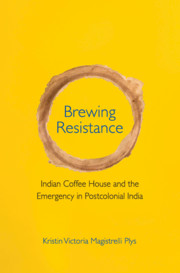Book contents
- Frontmatter
- Contents
- Acknowledgements
- 1 Introduction
- 2 How Anti-Colonial Labour Movements Create Anti-Authoritarian Autonomous Zones
- 3 Indira Gandhi’s Political Economy of Development
- 4 Social Movements of the 1970s
- 5 Emergency at Midnight
- 6 The Coffee House Movement
- 7 ‘Coffee House’ Workers’ Anti-Colonial Labour Movement
- 8 Conclusion
- Appendix I Photographs
- Appendix II Political Parties during the Emergency
- Appendix III Methodological Appendix
- Bibliography
- Index
2 - How Anti-Colonial Labour Movements Create Anti-Authoritarian Autonomous Zones
Published online by Cambridge University Press: 12 May 2020
- Frontmatter
- Contents
- Acknowledgements
- 1 Introduction
- 2 How Anti-Colonial Labour Movements Create Anti-Authoritarian Autonomous Zones
- 3 Indira Gandhi’s Political Economy of Development
- 4 Social Movements of the 1970s
- 5 Emergency at Midnight
- 6 The Coffee House Movement
- 7 ‘Coffee House’ Workers’ Anti-Colonial Labour Movement
- 8 Conclusion
- Appendix I Photographs
- Appendix II Political Parties during the Emergency
- Appendix III Methodological Appendix
- Bibliography
- Index
Summary
In certain developing countries, therefore, they are quick to catch on and realize two or three years after independence their hopes have been dashed: ‘What was the point of fighting’ if nothing was really destined to change?
—Frantz Fanon, The Wretched of the Earth (1963)Anti-colonial labour movements created enduring institutions, including worker-occupied and self-managed workplaces that served as autonomous zones, such as the Indian Coffee House at Connaught Place. These types of institutions provided key resources to movements combatting authoritarian rule after colonial independence. In this chapter, I will begin with a discussion of the theoretical role of labour struggles in the context of national independence movements. Workers across the Global South played an important role in pushing independence movements to the left, demanding economic redistribution and a more equal society regardless of class, race, gender and caste. However, in the period following independence, the class structure in most states remained unchanged. Frantz Fanon posed the critical question of whether independence movements were really worth the effort if in the postcolonial period (or as Walter Rodney terms it, after ‘flag independence’) not much had changed for the working classes.
I take up Fanon's question with the benefit of an additional seven decades of hindsight and contend that anti-colonial workers’ movements may not have succeeded in their aim of eliminating class hierarchies and exploitation, but they did create various autonomous zones that proved potent during the latter part of the twentieth century when the very movements that brought about flag independence tipped into authoritarian rule. During this authoritarian moment of the 1970s Global South, the autonomous zones that anti-colonial workers’ movements created provided a key resource to those who wanted to restore democracy and civil rights. Forming an anti-authoritarian movement is especially difficult under such conditions. Without civil rights or other democratic protections, dissent is typically met with severe repression. Autonomous zones across the 1970s Global South helped anti-authoritarians resist the rollback of democracy and civil rights, supporting anti-authoritarian strategies of resistance that embodied the spirit of the anti-colonial workers’ movements.
- Type
- Chapter
- Information
- Brewing ResistanceIndian Coffee House and the Emergency in Postcolonial India, pp. 20 - 50Publisher: Cambridge University PressPrint publication year: 2020



